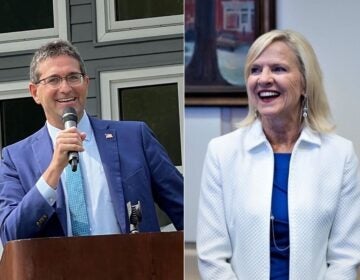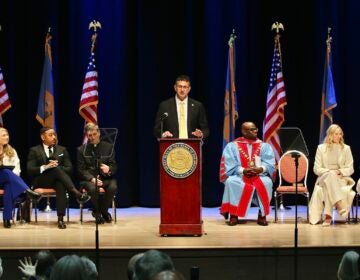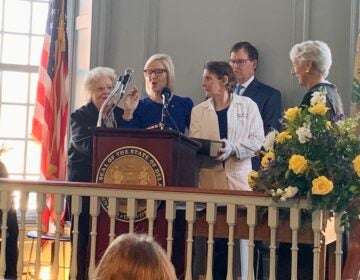Turmoil and revolt in Lt. Gov. Hall-Long’s gubernatorial campaign in Delaware over $207,000 in undisclosed payments to husband
Sources within the campaign said she stalled in providing bank statements. She says the money in question repaid her personal loans to campaigns.
Listen 2:23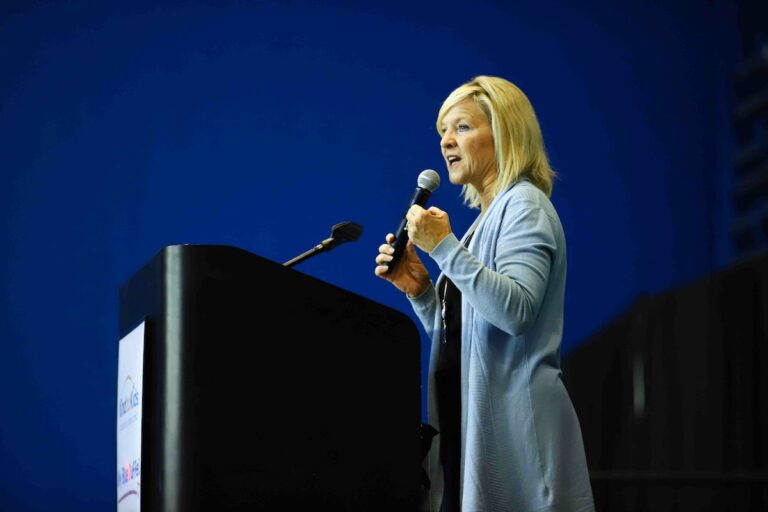
Lieutenant Governor of Delaware Bethany Hall-Long had to revise campaign finance reports after questions arose over payments to her husband. (Saquan Stimpson for WHYY)
This reporting was supported by a statehouse coverage grant from the Corporation for Public Broadcasting.
From Philly and the Pa. suburbs to South Jersey and Delaware, what would you like WHYY News to cover? Let us know!
The two months since Delaware Lt. Gov. Bethany Hall-Long announced her 2024 candidacy for governor have hardly been a smooth ride for the veteran politician.
Seriously bumpy is more like it, with perhaps plenty more turbulence looming.
The two-term incumbent Democrat received the immediate and wholehearted endorsement of Gov. John Carney when she announced her candidacy on Sept. 12. Yet barely two weeks later she had canceled fund-raising events — even one Carney was to host — and suspended all fund-raising, after members of her campaign staff and supporters raised pointed questions about campaign finance reports Hall-Long had filed from 2016 through 2022, according to three sources who have assisted the campaign.
Specifically, the sources said Hall-Long stalled for months before providing officials with the campaign bank records that formed the basis for the reports. When she did share the bank records, the sources said, several staffers and volunteers were alarmed to find several payments totaling more than $200,000 during that seven-year period to her husband Dana Long, her longtime campaign treasurer.
Those payments had not been disclosed in her campaign finance reports that are available to the public. Delaware law requires that all loans and repayments must be documented in campaign finance reports.
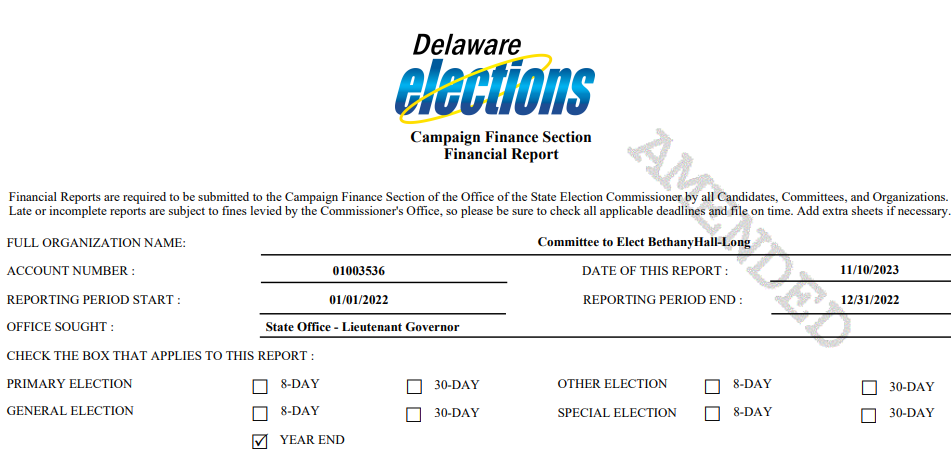
Though her campaign told prospective donors in an email that Carney’s planned Sept. 19 event to “honor” Hall-Long was being postponed so she “can attend to a personal, private matter,’’ the real reason was the revolt within the campaign over the payments to her husband, the sources said.
Carney did not respond to requests to his office for comment about the controversy swirling around his handpicked successor.
The sources said Hall-Long later told members of the 2024 team that she had loaned money to the campaign over the years, and had used her credit cards to pay campaign expenses. She said the undisclosed checks to her husband were repayments of those undisclosed loans, the sources said.
While Hall-Long had previously disclosed two loans totaling $70,000 during that period, according to reports reviewed by WHYY News, that’s barely a third of the amount repaid to her husband during that time.
Two sources said several people involved in the campaign were unsatisfied with her explanations and urged her to quit the race. They said she initially agreed to step aside, but then decided to remain a candidate for governor.
The slow response in producing spending records, the payments to her husband, and the failure to disclose them and other expenses led campaign manager Brandon Cox and chief fundraiser Jennifer Mueller to abruptly quit along with several volunteers within days of her campaign launch, the sources said.
The veteran operatives who spoke to WHYY News about the tumultuous events in Hall-Long’s campaign requested anonymity because they feared retaliation from the insular political world in one of America’s smallest states. Cox and Mueller did not respond to requests for an interview.
To date, Hall-Long has not hired a new campaign manager or chief fundraiser for a race expected to cost far more than $1 million to win the job overseeing an annual operating budget now at $5.6 billion and all state government departments, from the state police to transportation to health and social services. Along with a two-decade political career, Hall-Long is a longtime University of Delaware nursing professor.
She will face second-term New Castle County Executive Matt Meyer in a Democratic primary in September. No Republican has yet announced a candidacy for the November general election in a state where registered Democrats outnumber Republicans nearly 2 to 1 and hold all nine statewide elective offices.
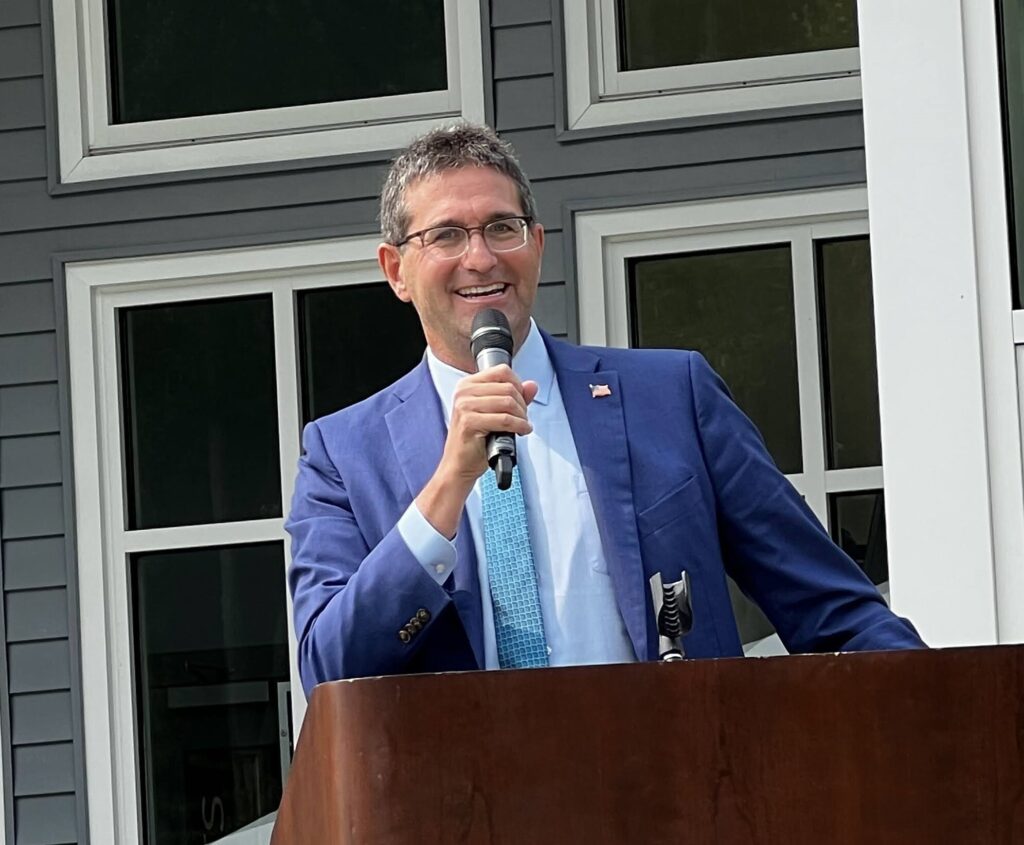
‘I regret the errors and confusion this has caused’
Bethany Hall-Long and Dana Long would not agree to an interview with WHYY News about the turmoil that roiled her campaign just as it was getting started.
She did not deny or even address the accounts shared with WHYY News in a written statement provided by her campaign, except to say, “I regret the errors and confusion this has caused, although unintentionally done.”
The rest of her statement noted that last week she “released seven years worth of amended filings that convey the results’’ of an audit she had announced on Sept. 28. “These amendments reflect loans and expenses that were incorrectly categorized, and identify the amounts of these loans as well as reimbursements.
Hall-Long’s statement added that she’s “open to policies that seek to improve transparency. We should always be looking for ways to improve our systems and how our government functions. Our campaign is moving forward and laser-focused on making Delaware the best place to live, work, and raise a family.”
The amended filings encompass all reports of the Committee to Elect Bethany Hall-Long since 2016 — the year she first ran for lieutenant governor — through 2022, the last report on record. All the original and amended reports her campaign filed during that period can be found on the Department of Elections’ campaign finance website.
The amended reports now show several loans from Hall-Long totaling $308,134 since 2016, and repayments of $206,985, though Dana Long is not listed as the recipient of the money.
“Hall-Long has personally loaned the campaign $101,149.35 more than she has been repaid,’’ the campaign said in a written statement issued Friday when the amended reports were announced.
Campaign spokeswoman Christine Freundlich told WHYY News this week that while the latest report for calendar year 2022 shows a loan balance of more than $100,000, Hall-Long “has no plans to repay herself” any of that money from contributions she has received this year or money she receives in the future. Her campaign finance report for 2023 must be submitted to the state Department of Elections in January.
Dana Long had been listed as his wife’s campaign treasurer in reports before 2016, but was not listed as treasurer in either the original or amended reports from 2016 to 2022. No one was listed as treasurer in the original reports for those years, but Hall-Long is listed as signing them electronically. The amended reports list Cheryl Webb as treasurer.
The lieutenant governor previously represented the Middletown area of southern New Castle County from 2002 to 2016 in the state House and Senate. Campaign reports for those years were not part of the campaign’s internal review of fund-raising and spending records.
‘I learned there may have been reporting issues’
While Lt. Gov. Hall-Long has not given any interviews on the trouble in her campaign and with her finance reports, her statement to WHYY News essentially repeated and piggybacked on a series of written statements her campaign has released since Sept. 28 — 16 days after her campaign launch.
Her Sept. 28 statement said that “while preparing to launch my campaign for governor, I requested a review of my past campaign finance reports and learned there may have been reporting issues that require attention.”
That statement, which came after she had canceled the events with Carney and other supporters, said she was “working with independent campaign finance experts and forensic accountants to thoroughly audit the finances.”
She also said in the statement that she would be “amending any reports as needed.”
On Oct. 26, the campaign released a new statement that said “an internal review conducted by a compliance firm … found that Bethany and her husband covered various campaign-related expenses using personal credit cards and loans that were not accurately reflected in previous campaign finance reports.”
The campaign said the Delaware-based firm Summit CPA reviewed records and found that “while reporting errors were made,’’ the couple loaned the campaign more money than they were repaid, and “no wrongdoings or violations were found.”
Hall-Long said then in a statement that after her team “identified these discrepancies, we immediately took the responsible step of halting our fundraising efforts and bringing in a CPA firm to examine our records. We also took the extra step of informing the public of this self-initiated process.”
She added that finance reports would be amended and that she was “now ready to resume fund-raising.”
And on Friday, the campaign announced that the reports had been amended to “correct categorization errors” that falsely listed loans as expenses.
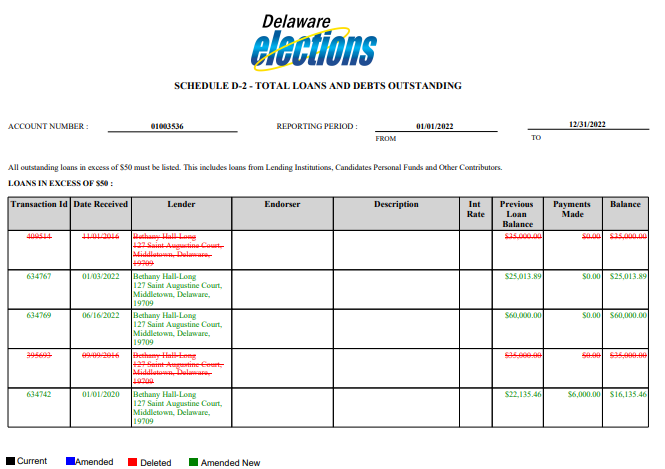
It said Hall-Long also paid for campaign expenses such as “television advertising, yard signs, campaign literature, and consulting” on her personal credit card “as a loan.” The amended report for 2017, for example, shows that more than $7,700 was paid to “American Express” and “Chase Credit Card.”
“As our campaign grew from the kitchen table around which I started my first legislative race to that of a statewide elected official, we should not have continued to take on the responsibility of managing the finance reporting,’’ Hall-Long’s statement last week said. “Going forward, our campaign reporting will be handled by experts in this field.”
Hall-Long’s statement also used a medical analogy.
“As a nurse, I deal in facts,’’ the statement said. “When a patient presents with a problem, you assess and diagnose, and then you take action. We’ve diagnosed the problem and we have now acted to amend any issues with the reports.”
Meyer says voters have ‘a lot more questions than answers’
Hall-Long’s public amendments and explanations have left many political observers unsatisfied.
Claire Snyder-Hall, executive director of Common Cause Delaware, a grassroots group that aims to protect and strengthen democracy, stressed that voters who contribute to campaigns “need to be able to trust that their money is being spent on legitimate campaign expenses rather than lining candidate pockets.”
She said that while it’s “encouraging” that Hall-Long amended the reports, the gubernatorial candidate should release the audit too “because that should go a long way in terms of restoring public trust. People do have questions.”

Doing so, she said, would let voters “be able to see for themselves and would help strengthen the public trust.”
Meyer, who announced his candidacy in June, said he agreed and noted that he doesn’t select the auditors of county government finances, and that all audits are made public.
Meyer also said while he hasn’t “scrutinized’’ the issue as deeply as others, it’s a “fair question’’ to ask his primary opponent how she could sign off on finance reports that year after year did not properly disclose what she now says were loans.
“Today, there’s historic levels of mistrust in government and historical levels of mistrust in elected officials and the only solution to address that mistrust is honesty and transparency,” Meyer said.
“Transparency means providing answers and Delawareans, including me, have a lot more questions than answers right now regarding this situation.”
Julianne Murray, who heads the state Republican Party and ran against Carney in 2020, said she and others were caught off guard when Hall-Long suddenly stopped raising money for her nascent campaign and announced a review of her finances.
“Everybody was surprised and intrigued by that,” Murray said. “You know, why wasn’t that taken care of before you announced?”
Murray joined others who say the audit should be released.
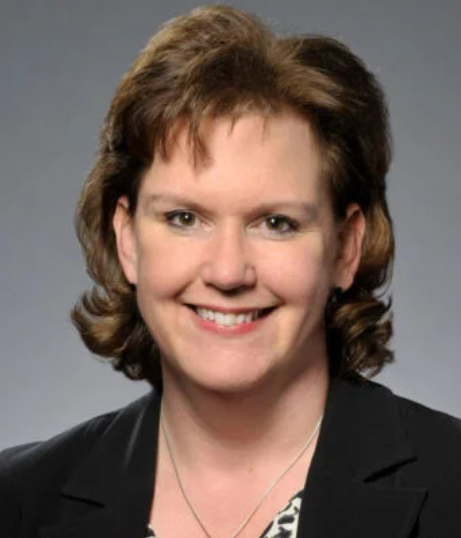
“If there’s no issues there, if all you needed to do was amend the reports, why not put out the audit findings,’’ Murray said. “Because she is not putting out the audit report, the people are starting to go, ‘Well, wait a minute. Why not?’ There’s only so much that endorsements and people saying there’s nothing to see here will carry the day with everyday Delawareans. I think it’s hurting her.”
Neither House Speaker Valerie Longhurst, who has endorsed Hall-Long, nor Senate President Pro Tem Dave Sokola, who served with her in the Senate but has not made an endorsement, responded to requests for comment.
Yet more than a dozen Democratic lawmakers publicly announced their support for her candidacy in recent weeks, albeit without mentioning the questions about her campaign finances.
State Sen. Stephanie Hansen, who also represents the Middletown area, told WHYY News she believes her friend and her husband made honest mistakes and is giving them the benefit of the doubt. She said the state’s campaign finance reporting system can be confusing.
“If this was an honest mistake compounded over the years, I can see how the final number of the amount that has been mischaracterized is going to be very large,” Hansen said.
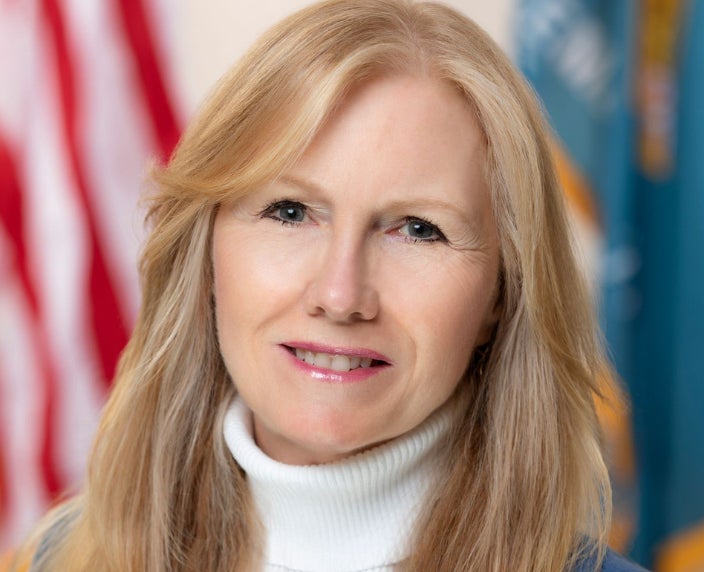
Hansen said that even though she properly disclosed a loan to one of her campaigns, she can see how Hall-Long might have erred.
“I think they were just thinking of it as an expense,’’ Hansen said of Hall-Long paying for a television ad with her credit card. That’s where it becomes a judgment call and a wrong one if you decide, ‘Oh, that’s an expenditure, not a loan.”
Snyder-Hall said that regardless of how one views Hall-Long’s actions, it has definitely generated voter interest in a primary election that’s still 10 months away in a state where even gubernatorial races usually don’t heat up until the summer. She also said the controversy could be a pivotal factor.
“I guess voters have to decide,’’ the Common Cause director said, “whether they think this is something that was an unfortunate oversight or if it was something else.”

Get daily updates from WHYY News!
WHYY is your source for fact-based, in-depth journalism and information. As a nonprofit organization, we rely on financial support from readers like you. Please give today.



